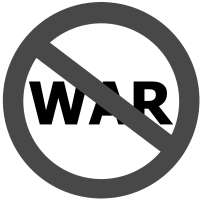“I just thank God we’ve got another high profile war to protest against,” declares Stan Stubbard of the East Crawley ‘Stop the War Alliance’. “That’s the paradox of being an anti-war activist – if there aren’t any visible wars going on, nobody knows that we exist or of the vital work we do, even though the lack of conflict means that we’re succeeding.” Russia’s invasion of Ukraine has seen Stubbard’s organisation – not to be confused with the better known ‘Stop the War Coalition’ – swing into action, organising demonstrations and protests throughout West Sussex, denouncing NATO and the EU for starting the conflict. “It gets a real reaction – not like when all we had to protest about was the West Bank or Syria. Or even worse, the Yemen,” he explains. “I mean, nobody even knows where the Yemen is, so why should they care if there’s a war going on there. But Russia and Ukraine, most people around here have heard of them, so instead of being ignored as we hand out leaflets in the town centre denouncing warmongers, now we get a reaction. Just last week some bloke threatened to punch my lights out and called me a ‘Putin apologist’, for instance.” For Stubbard, the risk of abuse and violence is seen as an acceptable price to pay for taking a principled stand against war and the causes of war. “Getting shouted at or punched is a small price to pay in terms of the campaign for world peace – it simply goes to show the extent to which the establishment have indoctrinated ordinary people to the idea that violence is the only way to resolve conflict,” he muses. “These are high stakes that we are playing for – if we don’t get out on the streets of Crawley protesting, then thousands more could die in global conflicts.”
The Sleaze, however, put it to Stubbard that the hostility he and his colleagues encounter has less to do with their overall message of peace, than it has their apparent refusal to recognise that Russia is the sole perpetrator of the current conflict and that Ukraine has every right to defend itself against such unprovoked aggression. “Oh come now, we all know that it takes two to make a fight – there are grievances on both sides, I’m sure. Our mission isn’t to stand in judgement, but rather to condemn both sides equally for resorting to violence to resolve their differences,” he replies. “Besides, we all know that the real villains here are NATO and the EU, who have continued to expand Eastwards, deliberately intimidating and provoking the Russians.” This belief that NATO and the EU are somehow responsible for the war is a major reason for ‘Stop the War’ campaigners trying to prevent Western governments from aiding Ukraine. “Look, they just want to stoke things up there and expand the conflict in order to justify more spending on arms,” he opines. “If we give the Ukrainians more weapons, then it will just lead to more deaths. Although, of course, the more deaths of innocent Ukrainians there are, the more repulsed with war people will become, thereby reinforcing the anti-war cause. But if we aren’t the ones supplying the weapons or military assistance, then at least our hands are clean and we can rightfully take a moral stand on the issue.”
Indeed, Stubbard believes that the best strategy for the Ukrainians would be not to fight back at all, but simply allow the Russians to occupy their cities peacefully, then mount a passive resistance of civil disobedience. “The casualties would be lower and they’d find that they were left with a deeply satisfying sense of moral superiority,” he says. “It worked for Gandhi, after all – a few years of him and his followers disobeying the British by sitting around in loin cloths and India was free from British Imperial rule. Sure, there was the odd massacre and a few beatings up, but it was all far less bloody than having a war for independence.” So dedicated to this concept of non-violent resistance is Stubbard, that he even practises it in his own life. “I remember, a few years ago, I was mugged in the street by a gang of ruffians. This was before I’d seen the light, so I fought back against them and ended up getting a bloody good kicking as well as being robbed,” he explains. “Well, I learned my lesson from that. When, a few years later, I was the victim of a home invasion by a gang of drug addled miscreants, I put up no resistance and showed them where all the valuables were. Well, I suffered no violence, so, as they were leaving, I gave them a lecture on the evils of violent crime and urged them to turn away from the ruinous path they were on. I’ll tell you, I felt bloody good having asserted my moral superiority. Mind you, they did come back and gave me a beating, but not before every man-jack of them had buggered me senseless.”
Critics of the various ‘Stop the War’ campaigns currently taking place have questioned whether the campaigners’ assessments of the situation are at all realistic or even if they truly are motivated by a sincere belief in global peace. “Their refusal to apportion blame in conflicts is based upon a deeply flawed analysis which seeks to draw a moral equivalence between West and East in the post Cold War world,” opines Professor Bob Mincer, lecturer in Geo-Strategic Analysis at the Dorking Night School of Horticulture. “The reality, of course, is that while the US and the rest of the West have done some pretty shitty things, unlike the soviet Union and its successors, they are democracies where the possibility of change driven public opinion exists, giving their policies some legitimacy. This is seen in their seeming belief that NATO should have been disbanded when the Warsaw Pact was, despite the former being a voluntary alliance, whereas the members of the latter had no choice as they were vassal states of the USSR.” Mincer claims that he is not unsympathetic to the anti-war movement. “Personally, I opposed the wars in Iraq and Afghanistan, believing that these Western interventions were made on dubious grounds and did more harm than good,” he says. “But the situation in Ukraine is completely different – they are the victim of an unprovoked attack.”
Mincer also contends that Stubbard and his ilk are motivated less by a desire to stop the war in Ukraine, than by a desire to express their moral superiority over everyone else. “Just look at the bollocks they post on social media,” he points out. “There’s no condemnation of Putin, let alone any real espressions of compassion for the suffering of Ukrainian civilians. No, it is all smart arsed sanctimonious comments clearly intended to establish that they are on a higher moral plane than anyone calling for more support for Ukraine – all condescending finger-wagging about the risks of expanding the conflict or nuclear war.” The academic believes that if these campaigners truly believe in peace, then should try a more practical approach. “Perhaps they should try going to Ukraine and form a human barrier between the two military lines,” he proposes. “Then they can see if pious hand-wringing and moralistic, but non-violent, finger-wagging can stop Russian tanks.”









